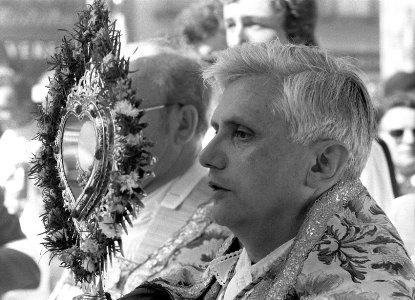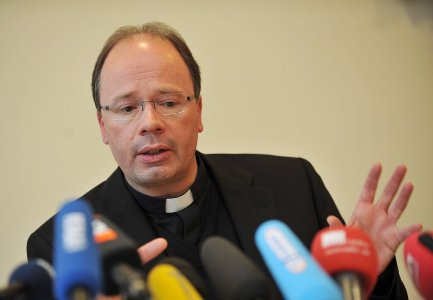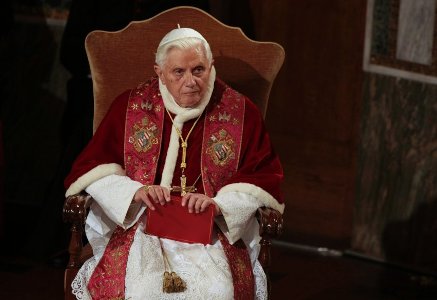By Dietmar Hipp, Frank Hornig, Conny Neumann, Sven Röbel and Peter Wensierski
Spiegel
March 22, 2010
http://www.spiegel.de/international/germany/0,1518,684970,00.html
GERMANY -- After long delays, the Catholic Church finally appears to be taking responsibility for sexual abuse cases. But it is an uncomfortable process. The pope even failed to take the problem of child abuse seriously when he was the archbishop of Munich.
Peter H. simply cannot understand why allegations are being made against him now -- especially after all these years. "Why me of all people?" the priest asked during a phone conversation with his friend, the mayor of Garching, a town near his own, Bad Tölz, in Bavaria.
 |
| Pope Benedict XVI is pictured here attending a Vatican concert given by the Regensburger Domspatzen boys choir in 2005 with his brother Georg Ratzinger. Several choir boys have said that the pope's brother, now in his eighties and living in a monastery, administered severe and violent punishments to his charges. Georg Ratzinger has come clean about his transgressions and said that he stopped slapping choir members when Bavaria banned corporal punishment in 1980. |
Yes, why him of all people? Especially when there are so many priests who have committed sins against children, and so many who have been treated leniently by the church. Back in 1980, even Joseph Ratzinger -- then the archbishop of Munich, and now Pope Benedict XVI -- had played a role in the decision to handle Peter H.'s pedophiliac infractions internally. No police, no state prosecutor, no trial. Therapy and brotherly love would bring this sinner back to the fold.
Events that linked Ratzinger and Peter H. decades ago are now causing their paths to cross once again. Last week, one of these two men, Peter H., was suspended from the priesthood, while the other, Pope Benedict XVI, signed a pastoral letter on clerical sexual abuse. The pope now wants to clear up these cases and aid the victims.
 |
| Back in 1980, Joseph Ratzinger -- pictured here in 1977 as the new archbishop of Munich -- played a role in the decision to handle a case of pedophiliac infractions committed by a priest internally. |
Is this a long-awaited turning point?
Finally, after much too much hesitation, there is now movement in the church -- at the lower level with Peter H. and at the higher level with the pope and the German Bishops' Conference. For the first time since the sex scandal erupted, church officials have indicated that they intend to tackle the problem seriously. In Bavaria, the Catholic Church now intends to report all such cases immediately to the authorities. "We all have to deal with the consequences of utter evil in the world and in the Church," says the current archbishop of Munich, Reinhard Marx. "This boil must be lanced. Everything must come out," his colleague in Bamberg, Ludwig Schick, adds. And the Bishop of Trier, Stephan Ackermann, who has been engaged by the Bishops' Conference to handle abuse cases, openly criticizes the institutions of the Church, admitting that "there have been cover-ups in a wide range of cases."
 |
| Stephan Ackermann, the bishop of Trier who has been engaged by the Bishops' Conference to handle abuse cases, has openly criticized the institutions of the Catholic Church, admitting that "there have been cover-ups in a wide range of cases." Meanwhile, the archbishop of Bamberg, Ludwig Schick, says: "This boil must be lanced. Everything must come out." |
Political Reaction May Lead to Official Enquiry
Politicians are also reacting. The German state of Hesse wants to make it mandatory for public and private schools to report all suspected cases of abuse and plans to launch a special investigation into all 33 boarding schools located in the state. Bavaria is calling for preventative therapy to be offered to any teachers or clergymen with pedophilic tendencies. And the German federal government has finally reached a decision on who will attend roundtable talks on the issue and what will be on the agenda. There may even be an independent commission of enquiry, if the German Justice Ministry has its way.
 |
| On Saturday, the head of the Catholic Church, Pope Benedict XVI, published a pastoral letter in which he addressed the recently revealed slew of clerical sexual abuse cases in Ireland. |
This collective toughening of attitudes is the result of weeks of mounting pressure. Germany's dioceses have been flooded with complaints and one of the first church officials entrusted with investigating cases of clerical misconduct has already resigned because he could not handle the work. Benno Grimm, from the diocese of Limburg, which covers territory in the states of Hesse and Rhineland-Palatinate as well as the city of Frankfurt, said that he could no longer cope with the number of allegations and reports and that the accounts of abuse were getting under his skin.
Public prosecutors also have their work cut out for them. Up until now, they have had few opportunities to prosecute because the statute of limitations has usually expired for the alleged crimes. But investigations are currently being conducted into at least 14 clergymen on suspicions of sexual abuse. This figure emerged after a SPIEGEL survey of all 24 public prosecutors in Germany. Nine refused to comment. In addition, 11 secular teachers and tutors are being investigated, including three former educators at the prestigious Odenwald boarding school.
 |
| However, Benedict XVI's letter arrived controversy in Germany that, as the archbishop of Munich, Joseph Razinger played a role in the decision to handle the infractions of a pedophiliac priest internally. No police, no prosecutor, no trial. Therapy and brotherly love would bring this sinner back to the fold. |
At the same time, many Germans are leaving the Catholic Church, especially in the Catholic stronghold of Bavaria, where the faithful have been shocked by scandals surrounding the renowned Regensburger Domspatzen boys' choir and the monastery school in Ettal as well as the reportedly lenient treatment of the pedophile priest, Peter H., by the pope's own former archbishopric in Munich. Officials in the cities of Regensburg and Munich report that, for the first half of March, the number of people leaving the church is nearly double when compared to the same period in February. (Editor's note: In Germany, church taxes are collected by the government and members of the Catholic and Protestant churches register with the local authorities.)
 |
| Italians protest against clerical sex abuse outside St. Peter's Square at the Vatican. |
People are unnerved because, for a long time, no one was able to credibly assure them that everything possible was being done to ensure that youth groups and schools were safe from sexual abuse. And their skepticism is understandable: The case of Peter H. is a prime example of how well the church's system to protect abusers works.
Young Priest Made 'Indecent Advances'
As a young chaplain in the diocese of Essen in 1979, H. forced an 11-year-old to engage in oral sex after a camp retreat. He reportedly had the boy drink alcohol before assaulting him. There were at least three more victims in Essen but their parents reportedly decided not to press charges to avoid putting their children through the ordeal. Instead they complained to the H.'s immediate superior, the parish priest of St. Andreas. That priest's handwritten report to the head of church personnel and the vicar general of the diocese of Essen states that H. had made "indecent advances" toward the children during his work in the parish.
Church officials in Essen decided not to press charges and instead arranged for their brother to enter into therapy in Munich. In the letter of transfer, written to the Bavarian diocese that Ratzinger then led, there was a clear admission that the priest had sexually assaulted children in his former parish. Munich was not left in the dark about what kind of problem was on its way to them, the diocese of Essen said last week.
The Diocesan Council, chaired by Archbishop Ratzinger, dealt with the case in Munich on Jan. 15, 1980. According to the minutes of the meeting, "Point 5d" on the agenda saw the council discussing Peter H., who had requested "accommodation and support in a Munich parsonage for a while." The request also stated that "Chaplain H. will undergo psychological therapeutic treatment."
Ratzinger Knew Police Hadn't Been Informed
A policeman's son, Ratzinger was well aware that no one had notified the police and that everything had been handled by the Church internally. Neither he nor his diocese reported the case to the authorities. Instead, a brief, succinct statement concerning the chaplain's application was entered into the minutes: "The request is granted."
Barely two weeks later, H. had been assigned to pastoral duties again. Ratzinger allegedly knew nothing of this. But his office did receive a note from his vicar-general at the time, Gerhard Gruber, concerning the chaplain's placement in the Catholic parish of St. Johannes Evangelist in Munich. Did Ratzinger overlook the memo? Gruber now says that he alone was responsible.
In the town of Grafing near Munich, H. again sexually abused several pupils. In 1986, a local court in Ebersberg in Bavaria handed out an 18-month suspended prison sentence and a 4,000 deutsche mark fine to H. He was also convicted of distributing pornographic materials.
Priest 'Always Kissed Children on the Mouth'
Church officials then simply transferred the pedophile from Grafing to Garching -- but apparently without informing the parish there of his history. Once again, children at his new place of work complained that their priest always kissed them on the mouth -- a practice they found disgusting. Mothers complained to the parish council, but nothing happened. In 2008, the first of his victims in Essen came forward: Wilfried Fesselmann, 41, was 11 at the time of the alleged abuse. The priest was transferred again, this time to his current place of residence in the town of Bad Tölz. Once again no warning was issued to the new parish, where the priest was able to conduct church services with the young people of the area. And it was not until last week that H. was finally suspended from priestly service.
And that is precisely the focus of the current discussion. What responsibility do people with knowledge of what has been done bear? And what about about the perpetrators' superiors? How could they enable pedophile priests to continue working in the Church? And what has the current pope done during his career in the Church to combat a sex problem that he is well aware of?
This debate has long since spread beyond Germany's borders. Observers in the English-speaking world are taking a particularly critical look at the role of Pope Benedict XVI. Time even ran a cover story on the pontiff in its international edition.
And with good reason. It was not only in Munich, but also later in Rome that Ratzinger missed countless opportunities to vigorously tackle the issue. For over 23 years -- until his election as pope -- he headed the Congregation of the Doctrine of the Faith, meaning that he was also responsible for dealing with reports of sexual abuse. From 1981, Cardinal Ratzinger exercised this power from a fortress-like palace in the Vatican, where he passed through heavy iron-studded gates every morning and every evening. Above the gates, the walls are still emblazoned with the coat of arms of the Holy Office, also known as the Inquisition, which held Galileo Galilei under arrest here and sentenced Giordano Bruno to death as a heretic.
For decades, Ratzinger accepted the fact that little attention was paid to the problem of sexual abuse. Instead he focused on reprimanding Latin American church activists who advocated liberation theology, a movement that defines the teachings of Jesus Christ differently, as well as feuding with controversial critics of the Catholic Church such as Eugen Drewermann and Hans Küng. His rare public statements during this period were dedicated to pet topics like "faith and reason."
A Parallel World of Murky Legality
It wasn't until 2001, after a sexual abuse scandal had rocked the Catholic Church in the US, that Cardinal Ratzinger took action. He decreed that the local churches now had to report all such suspected cases to his offices of the Congregation of the Doctrine of the Faith in Rome -- but under strict secrecy.
Monsignor Charles Scicluna currently serves as the church's Promoter of Justice, making him, in effect, the Vatican's internal prosecutor. Between 2001 and 2010, he investigated over 3,000 accusations lodged against members of the clergy who had allegedly violated their vows of celibacy.
In dealing with such cases, Church officials operate in a parallel world of murky legality. Clergymen play the roles of judge and prosecutor, files are kept secret and witnesses are questioned, but never informed of the purpose of the interrogation.
In 300 cases, the defendants were found guilty and given the mandatory maximum penalty: dismissal from the clergy. In another 300 cases, the defendants anticipated that they would be thrown out of the church and preempted this by asking to be dismissed. This group includes priests who had been caught with pornographic images of children. And around 1,800 priests only received a relatively mild punishment due to their advanced age: They were banned from performing the sacrament.
No Complaint, No Plaintiff, No Judge
All the while, state prosecutors remained relatively powerless to counter the church's leniency -- mainly because they know nothing about the offenses committed. When there is no plaintiff, there is no judge. As long as church officials do not file official complaints and succeed in persuading the victims' families not to report offenses to the authorities, then the Catholic Church can continue to act within its own realm, and beyond the reach of secular laws. Up until now, nobody from the outside world has been able to do anything about it.
So far, there are no known cases in which bishops or vicar generals have been prosecuted for protecting pedophile subordinates or because they allowed them to continue to work with young people -- as in the case with the priest Peter H.
Nevertheless, as the policies of the Evangelical Church in Germany (EKD), the official body of the country's Protestants, clearly demonstrate, it is actually possible to crack down on sexual offenders in the clergy. "As soon as initial suspicions arise," says EKD spokesman Reinhard Mawick, "they are reported to the police so the state prosecutor can investigate."
The Evangelical Church of Westphalia, for example, has had a 64-page manual on how to deal with sexual assault for a long time. These guidelines provide detailed information on how to recognize perpetrators and it also lists possibilities for best supporting victims. The Church has to take "active and clear steps to prevent sexual assault," it says in the publication.
In response to a request from SPIEGEL, the EKD has checked how many cases of abuse have come to light. Results have come in from nine of the 22 district churches across Germany. Over the past 10 years, there have been exactly 11 cases within those churches -- and only one had to do with pedophilia. Any clergymen or deacons involved were removed from the service of the church.
Any original material on these pages is copyright © BishopAccountability.org 2004. Reproduce freely with attribution.